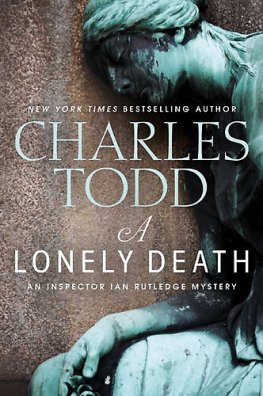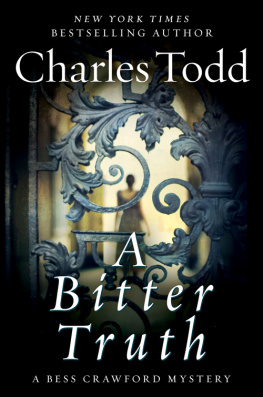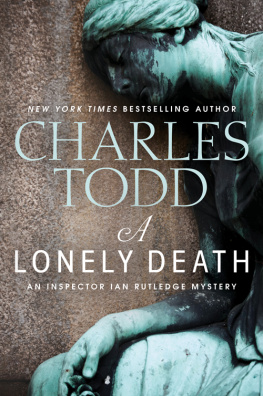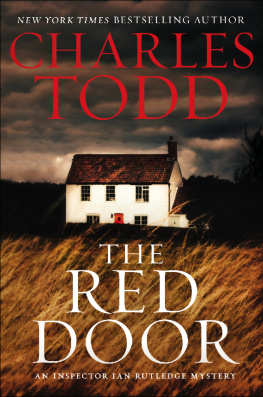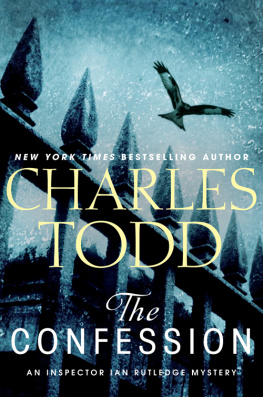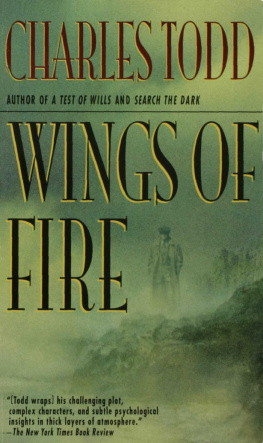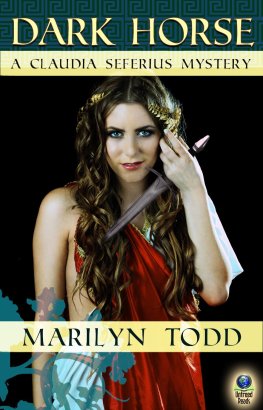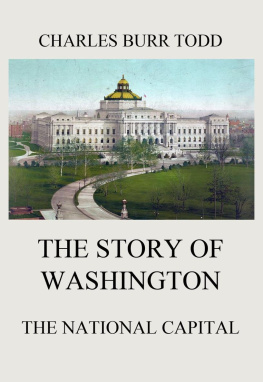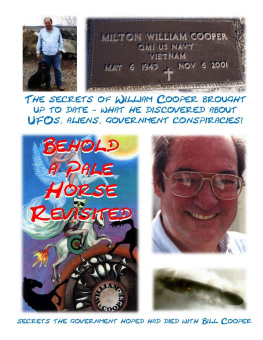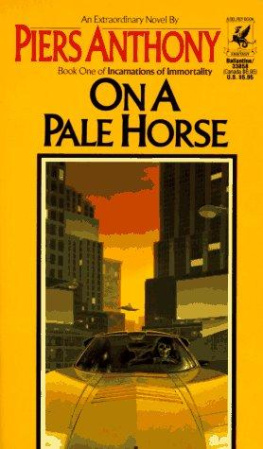Charles Todd - A pale horse
Here you can read online Charles Todd - A pale horse full text of the book (entire story) in english for free. Download pdf and epub, get meaning, cover and reviews about this ebook. genre: Detective and thriller. Description of the work, (preface) as well as reviews are available. Best literature library LitArk.com created for fans of good reading and offers a wide selection of genres:
Romance novel
Science fiction
Adventure
Detective
Science
History
Home and family
Prose
Art
Politics
Computer
Non-fiction
Religion
Business
Children
Humor
Choose a favorite category and find really read worthwhile books. Enjoy immersion in the world of imagination, feel the emotions of the characters or learn something new for yourself, make an fascinating discovery.

- Book:A pale horse
- Author:
- Genre:
- Rating:4 / 5
- Favourites:Add to favourites
- Your mark:
- 80
- 1
- 2
- 3
- 4
- 5
A pale horse: summary, description and annotation
We offer to read an annotation, description, summary or preface (depends on what the author of the book "A pale horse" wrote himself). If you haven't found the necessary information about the book — write in the comments, we will try to find it.
A pale horse — read online for free the complete book (whole text) full work
Below is the text of the book, divided by pages. System saving the place of the last page read, allows you to conveniently read the book "A pale horse" online for free, without having to search again every time where you left off. Put a bookmark, and you can go to the page where you finished reading at any time.
Font size:
Interval:
Bookmark:
Charles Todd
A pale horse
Berkshire Early April 1920
light
1
I t was nearing the full moon, and the night seemed to shimmer with
He walked down the lane and turned to look up at the hillside.
The graceful white horse cut into the chalk by ancient Britons galloped across the green slope without stirring from its place.
He couldn't see it without remembering. That was the only reason he had chosen to live in this Godforsaken place. To torment himself until he couldn't bear it any more.
The horses had died too, in that first gas attack. It wasn't just the men. The poor beasts couldn't know what the low-lying mist wafting toward them brought in its wake.
An eyewitness had likened the cloud to a great horse moving across a barren meadow, ambling toward the barn for its dinner. Not hurrying, not drifting, just moving steadily, without apparent purpose, without apparent design, following the wind as the horse followed the scent of its stall and the fresh hay heaped in the manger. But like the pale horse of the Apocalypse, on his back rode Death. And Hell had truly followed them.
He smiled grimly at the imagery.
He hadn't been there when the Germans unleashed the chlorine attack against the Allies at Ypres. Yet it had changed his life in ways no one could have foreseen.
He wished he'd never heard the name of that medieval Belgian town. He wished the Germans had never reached it. Or that the British had left well enough alone and let them have the wretched place.
There was a silver flask of brandy in his pocket, and he felt for it, uncapped it, lifted it to his lips, then paused.
What if he drank it to the dregs and crawled into the ruins of Way- land's Smithy to die, like a wounded animal hiding itself away until it either healed or breathed its last?
Would anyone care?
A shadow was coming up the road toward him. It was Andrew Slater, the smith. It was impossible not to recognize him, even at this distance. Andrew was built like a church tower, tall and broad and solid. But the man didn't turn at the lane. He passed by without speaking, as if sleepwalking, moving on toward the Smithy. Like to like.
It would be crowded inside with the two of them there, he told himself with black humor. Not counting whatever ghosts lingered in that narrow Stone Age tomb.
I envy Andrew Slater, he thought, there in the darkness. He lives only in the present, while I have only the past.
He drank a little of the brandy, for courage, saluting the pale horse with his flask. Then he turned and trudged back to his cottage and turned up all the lamps for comfort.
2
London Late April 1920
Ian Rutledge walked into his flat and sat down in the darkness. He was too tired to deal with the lamps. It had been a long and trying day. The hours he'd spent searching for a murderer had ended in the man's attempt to leap through the tenement window on the wild chance he could still elude capture. It had taken Rutledge and two constables to prevent it, and all three of them bore bruises to show for their efforts. Rutledge's shoulder ached, and the top of his left thigh felt as if it had been kicked by a horse. But then desperation had lent strength to the man.
In the darkness the voice of Hamish MacLeod answered him. A dead man's voice, but for nearly four years now it had seemed to Rut- ledge as real as his own. He had never grown used to hearing it, and yet with time he had come to terms of a sort with it. It was either that or madness. And he feared madness more. "Ye nearly went out yon window with him."
It was true, he'd been faster than the stunned constables, and got there first. He'd read the flare of intent in the man's eyes, and reacted to that just as the man's muscles had tightened to turn his back on them and race for the casement.
"A better death than hanging," Rutledge said, "if he'd succeeded. But he'd have gone scot-free if he'd been lucky enough to land on that shop roof just below and to the left. I couldn't chance it. He'd have killed again. It was in his nature."
Rutledge let the silence wrap him, closing his eyes and resting his head on the back of his chair, waiting for jangled nerves to find solace if not peace.
He had nearly let himself drift into a shallow sleep when there was a knock at his door.
Shaking off the torpor of exhaustion, he got up reluctantly and crossed the room. When he opened the door, he found his sister Frances standing there.
"Ian? Are you all right?" Her gaze went beyond him to the dark flat, and that sixth sense of hers seemed to catch the atmosphere like a sleek cat scenting danger.
"Tired, that's all. Come in. I've yet to turn up the lamps. I haven't been home long."
"Well, I'm here to dig you out of your cave. I'm meeting friends for dinner, and I need an escort."
"Frances. There must be half a hundred men who would gladly take you anywhere, including Paris. What's happened to them? They can't all have decided to throw themselves off Westminster Bridge in despair."
Laughing, she followed him into the flat and waited as he lit the lamps and made the shadows retreat. Those in the room, she found herself thinking, as well as those of the spirit. Her instincts to come here had been right.
"Yes, well, they're none of them as handsome as you, Ian, and I might as well take the veil. It's hopeless."
Beneath the humor, her voice betrayed her. Either she was lying, or there was something wrong that she wasn't ready to talk about.
"Is there truly a dinner party?" he asked quietly.
"As a matter of fact, there is. You remember the Farnums. They're taking Maryanne Browning out to dinner, invited me, and included a friend of yours. At least I think you count her among your acquaintances if not your friends."
Maryanne was a widow, her husband Peter a victim not of the war but of the Spanish flu. Rutledge had spent New Year's Eve at her house, at a party that he didn't care to remember.
"You aren't matchmaking, are you?"
"Good God, no! I'm truly fond of Maryanne, but I'm harboring no hopes in that direction. We've been trying to keep her busy, Ian, rather than leaving her to mope. And so all of us in her circle take it in turns seeing to it that she's not forgotten. Or left out of things."
He believed her. It was a kindness Frances would think of- and do.
"I'm tired, I told you. Do you really need me to make up your numbers?"
He caught something in her expression as she said offhandedly. "Simon can't come tonight. He's in Scotland."
And that was the nub, of course. She was growing quite fond of Simon Barrington. She hadn't shown a preference for any of her suitors, not for years. Not since Richard, who never was her suitor, but possibly the only man she'd loved. She was clearly disappointed that Barrington was out of the city.
More than usually disappointed.
He made a mental note of it, then answered, "All right, I'll come, if you give me a quarter of an hour to change. Help yourself to a drink, if you like."
She gave him a swift embrace. "I knew I could count on you."
As he walked into his bedroom he called, "Who is the other person? You mentioned that I knew him?"
"It isn't a him-it's a her. Meredith Channing. She and Maryanne have become friends."
He stopped on the point of taking off his coat.
Meredith Channing
An attractive woman who knew far too much for comfort. About him, about the war, about-
He'd almost said Hamish, but he was nearly certain she hadn't read that nightmare in his mind. He'd blocked it for so many years now that it was habit to keep the Somme and Hamish and the firing squad shut firmly away where no one could find it.
Hamish said, "Don't go."
And Rutledge caught himself just in time, before he answered aloud. "I've already promised," he said silently. "I can't go back on it without explaining why. And that I shan't do."
Font size:
Interval:
Bookmark:
Similar books «A pale horse»
Look at similar books to A pale horse. We have selected literature similar in name and meaning in the hope of providing readers with more options to find new, interesting, not yet read works.
Discussion, reviews of the book A pale horse and just readers' own opinions. Leave your comments, write what you think about the work, its meaning or the main characters. Specify what exactly you liked and what you didn't like, and why you think so.

